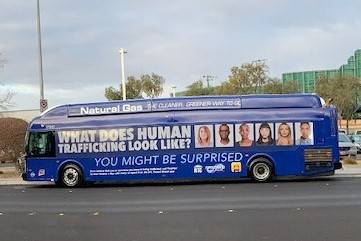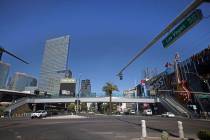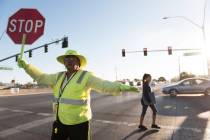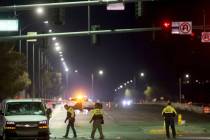RTC launches effort to raise awareness of human trafficking
With Nevada ranking among states with the most cases of human trafficking, local law enforcement and victims need all the help they can get.
The Regional Transportation Commission of Southern Nevada is using a $160,000 federal grant it received last year to raise awareness of human trafficking. The campaign will be rolled out in January, which is National Slavery and Human Trafficking Prevention Month.
The National Human Trafficking Hotline ranks Nevada 13th in the number of trafficking cases reported. Since 2007, nearly 3,400 calls have been made to the national hotline regarding Nevada, leading to over 1,400 trafficking victims being identified.
In 2019, the year of the latest data available from the National Human Trafficking Hotline, there were 239 cases of human trafficking reported in Nevada. Of those, 200 were identified as sex trafficking, 15 were unspecified, 15 as labor trafficking and nine as both sex and labor trafficking.
The majority of victims in Nevada in 2019 were women, with 209 of the 239 reported cases involving females. And most of the cases involved adults, with 163 being identified as over 18 years old.
The RTC’s awareness campaign will include posting signs at the valley’s transit stops, posters inside RTC facilities and a building wrap at the commission’s downtown transit center, inside and outside of buses, on digital billboards and on its social media platforms.
The advertisement included in the campaign shows six people of different races and genders with “What does human trafficking look like? You might be surprised” featured alongside the photos.
Tips called in by the public are very important in identifying those being trafficked, as 89 of the 239 cases reported in 2019 in Nevada were identified via reported public tips, National Human Trafficking Hotline data showed.
Warning signs that might reveal someone is a victim of human trafficking, according to the Nevada attorney general’s office, include:
— Malnourished appearance and/or poor physical and dental health.
— Injuries or signs of physical abuse.
— Appearing to be conversing off a rehearsed script when spoken to.
— Not being allowed to speak for themselves in public.
— Not having many personal possessions.
— Tattoos or branding on neck or lower back.
All front-line RTC employees, transit operators and security officers are trained to help identify human trafficking victims and assist them in safely leaving their traffickers.
The RTC program includes partnerships with the UNLV Criminal Justice Department, which reviews the agency’s training program, and FirstMed Health and Wellness, which provides relief services once a victim is identified.
MJ Maynard, RTC CEO, said that because traffickers utilize public transportation in many cases to transport victims, programs like the one being rolled out are vital to helping end the modern-day slavery practice.
“Traffickers rely on the transportation industry in every phase of human trafficking, from recruitment to the delivery of victims to buyers,” Maynard said in a statement. “Public transit agencies may come in contact with victims on a regular basis, and this grant allows us to become part of the solution.”
Contact Mick Akers at makers@reviewjournal.com or 702-387-2920. Follow @mickakers on Twitter. Send questions and comments to roadwarrior@reviewjournal.com. Please include your phone number.





























